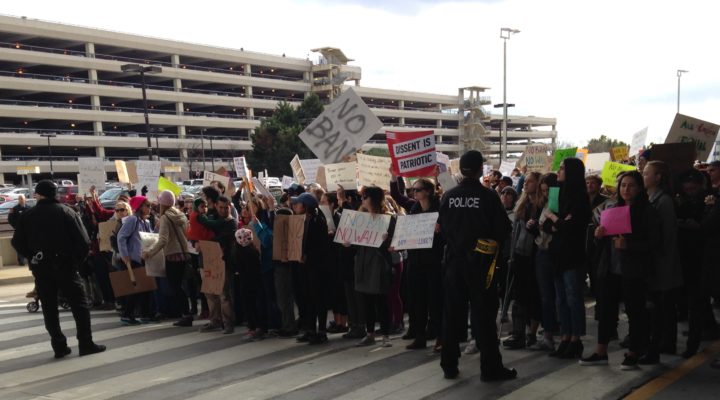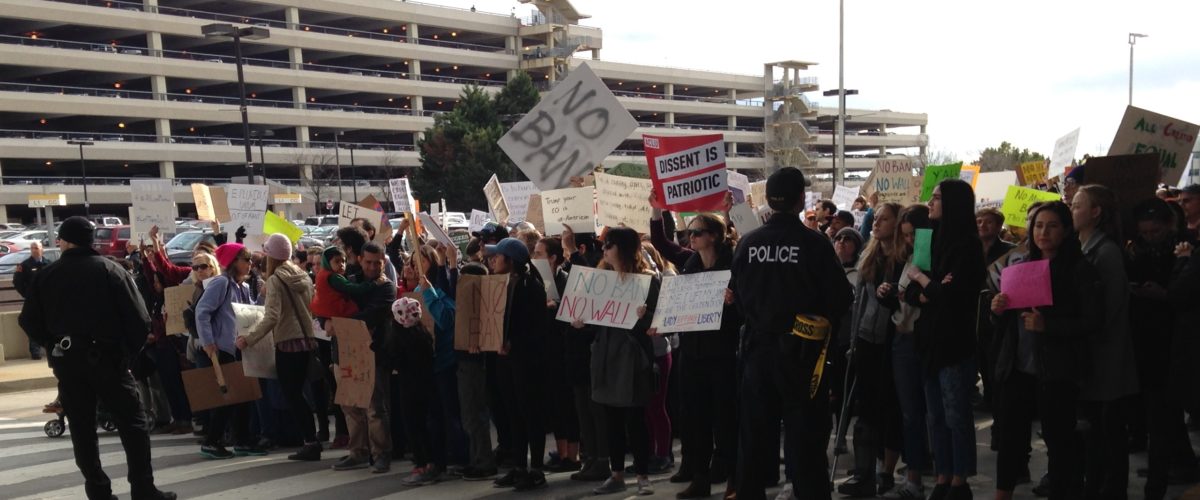As protests spread across the country over President Trump’s executive order banning travelers from seven Muslim-majority states from entering the United States, prominent Baptists joined other religious voices speaking out in opposition.
Amanda Tyler, the new executive director of the Baptist Joint Committee for Religious Liberty, called the action “a back-door bar on Muslim refugees” telling an entire faith group they are unwelcome on American soil.
The Cooperative Baptist Fellowship pledged to continue its work with refugees and immigrants despite the presidential order.
“As Baptist Christians, the love of Christ compels us to stand in solidarity with our global neighbors — the oppressed, the unheard and those on the margins,” said CBF Executive Coordinator Suzii Paynter. “As a Fellowship, our churches and field personnel stand with refugees and immigrants here in the United States and around the world, spreading hope and offering comfort in a world that all too often offers hate and fear over peace and welcome.”
The executive order imposes a 120-day moratorium on refugee resettlement and indefinitely suspends the entry of Syrian refugees. It also bars immigrants from seven countries — Iraq, Iran, Libya, Somalia, Sudan, Syria and Yemen — for 90 days.
Titled Protecting the Nation from Foreign Terrorist Entry into the United States, the order claims that numerous foreign-born individuals have been convicted or implicated in terrorism-related crimes since 9/11, including those entering the country with visas or U.S. refugee resettlement program. Deteriorating conditions around the world, it said, “increase the likelihood that terrorists will use any means possible to enter the United States.”
“The United States must be vigilant during the visa-issuance process to ensure that those approved for admission do not intend to harm Americans and that they have no ties to terrorism,” the executive order says. “In order to protect Americans, the United States must ensure that those admitted to this country do not bear hostile attitudes toward it and its founding principles. The United States cannot, and should not, admit those who do not support the Constitution, or those who would place violent ideologies over American law.”
Tyler, who took office Jan. 1, said any attempt to ban Muslim refugees based on their religion betrays American values and religion betrays American values and sends “the un-American message that there are second-class faiths.”
“A threat to anyone’s religious liberty is a threat to everyone’s religious liberty,” she said. “We as Baptists stand with those facing religious persecution around the world, regardless of their faith.”
The Know Your Neighbor program of the Islamic Networks Group, a coalition of faith-based and humanist organizations including the BJC and Alliance of Baptists, called for increased interfaith engagement, education about Muslims and Islam and commitment to and training in being “upstanders” who respond supportively to incidents of hate and bigotry.
Paula Clayton Dempsey, the director of partnership relations for the Alliance of Baptists, said more than half of all refugees are children, many of them orphaned by the violence that sent them packing.
“The Alliance of Baptists joins the international call for justice and mercy for such vulnerable people,” Dempsey said. “Our faithful actions of advocacy for the rights of refugees is rooted in our concern for all human beings and the protection of the resident alien in biblical justice and Jesus’ call of righteous acts of compassion to those in need.”
The Interfaith Immigration Coalition re-opened a 2016 petition signed by 2,000 religious leaders supporting refugee resettlement from groups including the Alliance of Baptists, Baptist Peace Fellowship of North America and American Baptist Churches USA.
“As people who follow Jesus we are clearly instructed that what we do to ‘the least of these’ we do to him,” said Ashlee Wiest-Laird, pastor of First Baptist Church in Jamaica Plain, Mass., and a 1991 graduate of Southern Baptist Theological Seminary. “Jesus’ solidarity with the marginalized demands that we too speak up for those who are being oppressed. To deny refugees, or anyone, welcome to this land because of their religion is not only un-American, it is antithetical to the Christian faith.”
Leaders of the Southern Baptist Convention, the nation’s largest Baptist group, appeared more supportive of the crackdown on immigration. Robert Jeffress, pastor of First Baptist Church in Dallas, told The Huffington Post that he “wholeheartedly” supported the president’s temporary ban on refugees from countries the administration deemed high risk.
“President Trump’s actions are in keeping with the biblical mandate for government to protect its citizens,” said Jeffress, a member of Trump’s Evangelical Executive Advisory Board who preached at his inauguration. “While Scripture commands individual Christians and churches to show mercy to those in need, the Bible never calls on government to act as a Good Samaritan.”
Former SBC President Ronnie Floyd said in a blog that while Christians must love refugees, the government’s first responsibility is to keep citizens safe.
“President Donald Trump was clear in his campaign and to this very day about his strategy relating to the security of our nation,” said Floyd, pastor of Cross Church of Northwest Arkansas. “Whether it is President Trump, a past president, or a future president, each has the responsibility to secure our nation. Due to the changing state of our world, this can look different from administration to administration.”
Last year in St. Louis the SBC passed a resolution on refugee ministry that in part called on governing authorities “to implement the strictest security measures possible in the refugee screening and selection process, guarding against anyone intent on doing harm.”
A federal judge granted a request by the American Civil Liberties Union for a nationwide temporary injunction to block the deportation of people stranded in U.S. airports under the Muslim ban.
“The United States is a nation governed by the rule of law and not the iron will of one man,” said ACLU Executive Director Anthony Romero. “President Trump now has learned that we are democratic republic where the powers of government are not dictatorial.”






